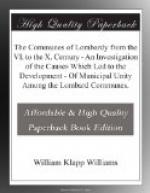THE COMMUNES OF LOMBARDY FROM THE VI. TO THE X. CENTURY.
PART I.
THE LOMBARD CONQUEST AND ITS RESULTS.
Before tracing the beginnings of renewed municipal life in Northern Italy, we must consider the conditions of land and people, which first rendered possible and then fostered the spirit of local independence of which such beginnings were the natural expression. To do this we must commence our researches with the first domination of the Lombards in the country.
In detail the story of the conquest of Northern Italy by the Lombards under Alboin, in 568, hardly differs materially from that of the inroads of other barbarian tribes of the north on the fertile plains of Italy. The causes were the same. Where the distinction is to be found from other such invasions, is in the results of the Lombard occupation, and in the different methods which the Lombards adopted so as to render their power and their possessions permanent. Let us look at the character of this invading host, which sweeps like a tide, at once destroying and revivifying, over the exhausted though still fertile plains of the Po and the Adige. Are we to call it a moving people or an advancing army? Are we to call its leaders (duces, from ducere to lead), heads of clans and families, or captains and generals? Finally, is the land to be invaded, or is the land to be settled? To all these questions the only answer is to be found in the conception of the absolute union of both the kinds of functions described. A people is moving from a home whose borders have proved too narrow for its increasing numbers; an army is conquering a new home, where plenty will take the place of want, and luxury of privation. It is not an army marching at the command of a strongly centralized power to conquer a rich neighbor, and force a defeated enemy to pay it service or tribute. It is a body which, when it has conquered as an army, will occupy as a people; when it is established as a people, will still remain an army. The sword was not turned into the ploughshare; but the power to wield the sword had given the right to till the land, and soon the power to hold the land was to give the right to wear the sword. It was the conquest of a highly civilized agricultural people—whose very civilization had reduced them to a stage of moral weakness which rendered them totally unfit to defend themselves—by a semi-barbarous people, agricultural also, but rude, uncivilized, independent, owning no rulers but their family or military chiefs.




